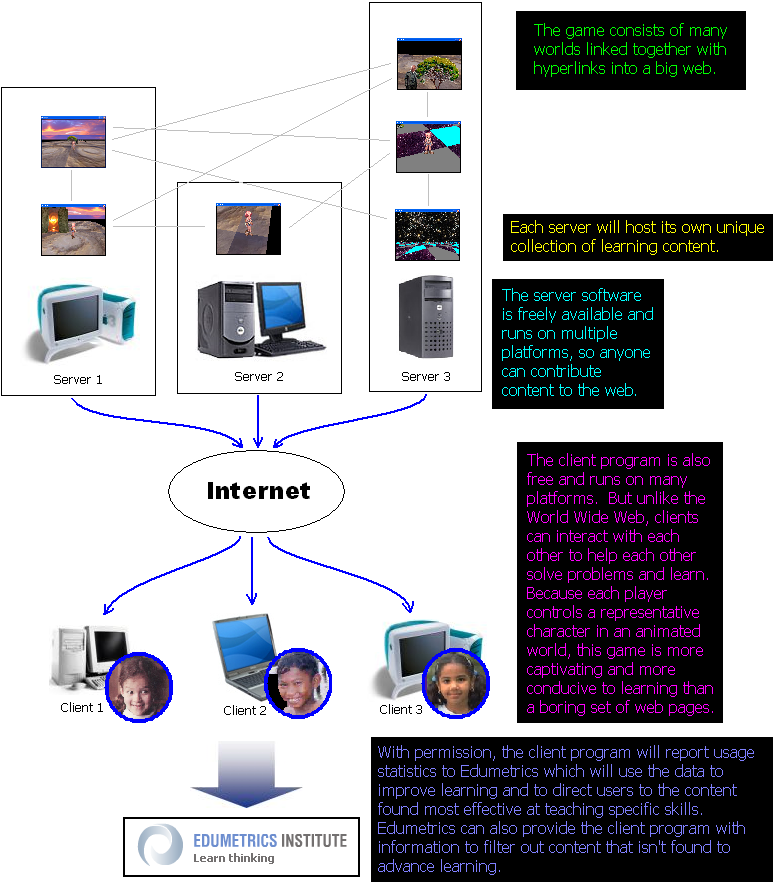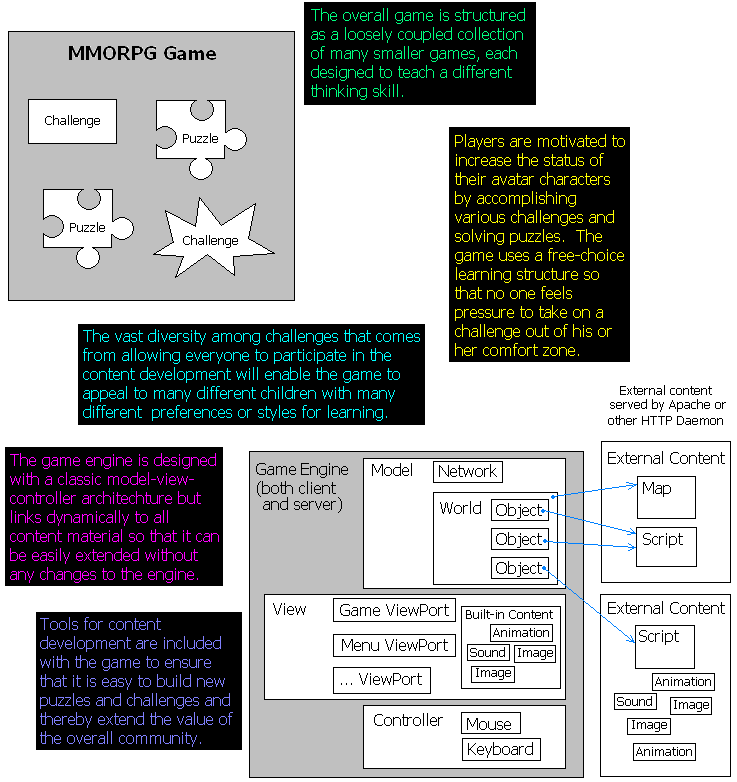
Overview of Isotope
Isotope is an online multiplayer video game. (It also works in single-player mode, but multiplayer mode is obviously more fun). It differs from traditional MMORPG's in four ways:
1- Purpose
The purpose of this game is to teach thinking skills. Monster-killing doesn't really accomplish this, but puzzle-solving is a natural fit.
2- Decentralization
Isotope is modeled after the world wide web in that it consists of many clients and many servers. Each server is responsible to serve its own set of pages (except in this case a page is actually a realm/world/map in the game) and all the pages are linked together in a big web. It's more realistic than a web page because you have an avatar character that represents you, you can see other people in the same locale, you can interact with other people on the same page, etc. Isotope pages can link to web pages, and web pages can link to Isotope pages if you have the right plug-in for your browser, so Isotope can be thought of as an extension to the WWW.
Anyone is welcome to contribute to the game, but if we (Edumetrics) don't like your content you'll have to host it on your own servers. It's okay if people make content that we don't approve of because we won't link to it. Also, our client has the ability to ask us about particular pages to find out whether they contain safe content and whether or not they are thought to effectively teach thinking skills. If we don't like a certain page, we'll simply give it a low rating. If users choose to turn off the content-filtering and content-prioritizing functionality of the client program, that's fine with us. We believe in "free learning" where people learn when and what they choose to. If someone develops a new client program in the future that doesn't even support our content-prioritizing capabilities, that's okay too. If the web grows in a direction we don't like, that won't affect the teaching quality of our game or diminish the value of our product.
There is no need for us to police what content people add to the game. It would be a bad idea for us to try to control what people make because then people will stop contributing. So instead we simply ignore content that we don't like and effectively push it off into web limbo.
3- Bot Friendly
Most MMORPG's fear bots because they give script-savvy users the unfair advantage of special capabilities in the game. Our game is designed such that bots won't give users any real advantage. If someone actually produces a bot smart enough to give the user an advantage over certain pages, this would constitute a good thing. Either the puzzles on the page are so lame that they can be solved without thinking, or the bot is so smart that it advances the state of artificial intelligence. We're happy to encourage the elimination of busy-work and the encouragement of AI development.
Many MMORPG's enable users to accumulate wealth by killing monsters. They don't want users to employ a bot that will kill monsters while the user sleeps because then the user will wake up with lots of money that he didn't earn. Because each puzzle in our game is uniquely scripted, it would be nearly impossible to design a bot that could mechanically work more than a single page in our universe. Since it's easier to solve a puzzle than write a bot to solve the same puzzle, they're really not a problem for us. We like to think of our universe as a grand challenge breeding ground for intelligent bots.
In order to make sure hackers and bots can't do things they aren't allowed to do in our game, the server must validate changes that have potential to be "physical impossibilities" like warping, speeding, passing-through-walls, multiplying, flying, etc. In some cases, however, pages may wish to allow some surreal concepts while disallowing others. So reality-checks are included in the scripting code for each object such that the page-designer can create reality however he chooses and the server can still validate it.
4- Unique Economic Model
todo: write this section
A good diagram is worth 1000 words, so...


Origin of the name "Isotope": The term "isotope" refers to a variant of an atom with a different number of neutrons. For the most part isotopes of the same element have approximately the same properties, but the subtle difference in mass can have useful value in some cases. For example, Uranium 238 is more useful for making atomic bombs than Uranium 235. We picked the name "Isotope" as a code-name for our project because we wanted to embrace the open-source concept of encouraging people to build isotopes, so to speak, of each other's work. We believe that one of the reasons the world wide web was so successful is because web browsers provided the feature to view the source of other people's web pages, thus enabling you to make variants of their work for your own purposes. We incorporated this idea into Isotope by allowing you to view the source of the maps and scripts that comprise the worlds you visit. We hope this will encourage people to build on our work and the work of others (with permission of course) to create a massive universe of puzzles and learning games. As an acronym Isotope stands for "Interactive System of Open Teaching Of Puzzles for Education" or something like that.